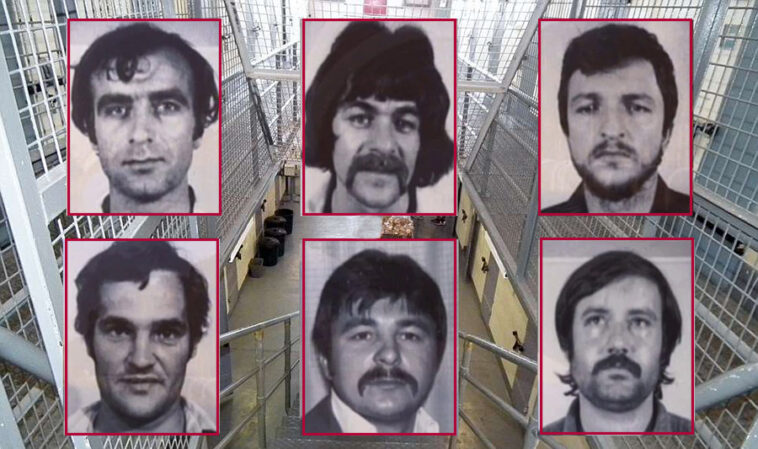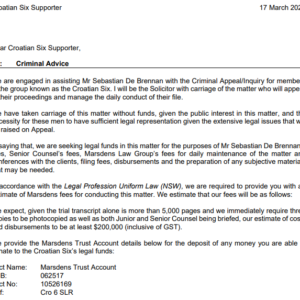It seems the wheels of justice have finally started to turn for Max Bebic, Vic Brajkovic, Tony Zvirotic, Joe Kokotovic, his brother Ilija Kokotovic and Mile Nekic – also known as the ‘Croatian 6’.
Back on 30 August 2022, after more than 43 years from their initial arrest on February 9, 1979, the Supreme Court of NSW directed that an inquiry be conducted into the convictions of the Croatian Six, with judge Justice Wright finding that he was “comfortably satisfied, that there are a number of doubts or questions as to parts of the evidence in the case and the guilt of the Croatian Six”.
Justice Wright also said there was a “real possibility that the Yugoslav Intelligence Service (UDBA) used a Bosnian Serb by the name of Vico Virkez as an agent provocateur or informer, to cause false information to be given to the NSW Police, and possibly ASIO, as to the existence of a bombing conspiracy involving the Croatian Six, in order to discredit Croatians in Australia”.
Described as a “historic decision”, the case was reported in the Sydney Morning Herald: ‘NSW Supreme Court orders inquiry over ‘Croatian Six’ bomb plot convictions’
Now nearly 7 months later, the NSW Supreme court has announced the appointment of Justice RA Hulme to lead an inquiry into the Croatian 6 case.
Justice Hulme was sworn in as a judge for the NSW Supreme Court in 2009 and has worked on both defence and prosecution.
Early on in his career, Justice Hulme assisted Justice James Wood in overturning the Ananda Marga convictions during the Royal Commission into the New South Wales Police Service, also known as the Wood Royal Commission, that was held between 1995-97.
The Ananda Marga case or the Yagoona 3 case was in many ways eerily similar to that of the Croatian 6.
Having served six years behind bars for the 1978 Hilton bombing, the Yagoona Three were pardoned after a judicial inquiry cast doubt on the evidence of their key accuser, the police informer Richard Seary.
But the similarities do not stop there as some of the arresting police were the same in both cases, now both widely accepted as being some of Australia’s most notorious miscarriages of justice.
However, the incredulity in the Croatian 6 case went a couple of steps further.
Firstly, in the Croatian 6 scenario, there was no bombing unlike with the Hilton tragedy and secondly, the ‘evidence’ looked positively cartoonish: for example, sticks of gelignite sticky taped to old-fashioned alarm clocks just as one example.
To this day, this trail holds the infamy of being Australia’s longest criminal trial.
In a 1991 ABC Four Corners program, Virkez, admitted he had received undercover training which came from his membership of the Serbian Black Hand, had been acting as a spy in Australia, had lied at trial, had been coached and told by police things that he needed to say, had made deals with the authorities, and had thought that the Croatian 6 were innocent.
Despite that, on 13 July 1994 the Governor of NSW refused applications for a retrial.
As to the police officers’ evidence, all six men denied that they had made the confessional statements which police sought to attribute to them and four of the six alleged they had been severely beaten by police.
Further, except for one man, the men denied possessing explosives or associated equipment and contended that the police evidence of finding the explosives and equipment had been “planted” on them. In the other case, it was suggested that Virkez (said to be a Yugoslavian spy) had stolen these himself from a power station.
According to various reports, disgraced former detective Roger Rogerson, one of the arresting officers later admitted that planting fake evidence during the 1970s and 1980s was all part and parcel of police culture.
Despite a strenuous defence all six were convicted and sentenced to serve 15 years imprisonment.
In 2012, Hamish McDonald, a journalist with the Sydney Morning Herald, published a short e-book, Framed, which dealt with the Croatian Six case, then in 2016 following this up with his in-depth book Reasonable Doubt, which exposed the entire case as being a false flag operating, most probably run by the Yugoslav Intelligence Service (UDBA).
Says Sebastian De Brennan, the criminal and human rights lawyer who has been working to see the Croatian Six declared innocent since 2012: “At the time of their arrest in 1979 the Croatian Six were members of Croatian national organisations that sought the creation of an independent Croatian state. The Croatian Six were charged with a number of serious offences including conspiracy to bomb as well as explosives and firearms offences. All the men, bar one, were also charged with conspiracy to murder.”
“During 1980 and early 1981, their trial took place. At the time, it was the longest trial in Australian legal history, occupying 172 sitting days.”
“111 witnesses gave evidence. Security precautions not before seen in Australian courts were adopted including a helicopter overhead and police on the roof of the court building at Taylor Square in Sydney. To give an indication as to just how large the trial was, the trial transcript alone exceeds 5,000 pages,” says De Brennan.
John R. Schindler, a professor of national security affairs at the U.S. Naval War College said that the Croatian Six affair was “a ‘classic’ agent provocateur operation run by the intelligence agency of the then communist regime in Belgrade, known as the UDBA, against exile communities that were against the Yugoslavian federation.”
He also claimed that former UDBA officials said that the Croatian Six case was “one of their great successes” in completely discrediting the Croatian Australians. According to Schindler, Australian Security Intelligence Organisation would have – or at least should have – been aware of UDBA’s involvement.
According to the NSW Supreme Court, the inquiry into the Croatian 6 case is set to begin in the second half of 2023.
Branko Miletic





Komentari